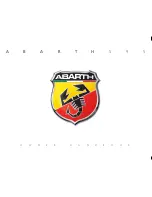
Fault finding
REF•17
REF
9 Suspension and steering
Note: Before diagnosing suspension or steering faults, be sure that the
trouble is not due to incorrect tyre pressures, mixtures of tyre types, or
binding brakes.
Vehicle pulls to one side
m
m
Defective tyre (“Weekly checks” ).
m
m
Excessive wear in suspension or steering components (Chapters 1
and 10).
m
m
Incorrect front wheel alignment (Chapter 10).
m
m
Accident damage to steering or suspension components
(Chapter 1).
Wheel wobble and vibration
m
m
Front roadwheels out of balance (vibration felt mainly through the
steering wheel) (Chapters 1 and 10).
m
m
Rear roadwheels out of balance (vibration felt throughout the
vehicle) (Chapters 1 and 10).
m
m
Roadwheels damaged or distorted (Chapters 1 and 10).
m
m
Defective tyre (“Weekly checks” ).
m
m
Worn steering or suspension joints, bushes or components
(Chapters 1 and 10).
m
m
Wheel bolts loose (Chapters 1 and 10).
Excessive pitching and/or rolling around corners,
or during braking
m
m
Defective shock absorbers (Chapters 1 and 10).
m
m
Broken or weak spring and/or suspension component (Chapters 1
and 10).
m
m
Worn or damaged anti-roll bar or mountings (Chapter 10).
Wandering or general instability
m
m
Incorrect front wheel alignment (Chapter 10).
m
m
Worn steering or suspension joints, bushes or components
(Chapters 1 and 10).
m
m
Roadwheels out of balance (Chapters 1 and 10).
m
m
Defective tyre (“Weekly checks” ).
m
m
Wheel bolts loose (Chapters 1 and 10).
m
m
Defective shock absorbers (Chapters 1 and 10).
Excessively-stiff steering
m
m
Lack of steering gear lubricant (Chapter 10).
m
m
Seized track rod end balljoint or suspension balljoint (Chapters 1
and 10).
m
m
Broken or incorrectly-adjusted auxiliary drivebelt - power steering
(Chapter 1).
m
m
Incorrect front wheel alignment (Chapter 10).
m
m
Steering rack or column bent or damaged (Chapter 10).
8 Braking system
Note: Before assuming that a brake problem exists, make sure that the
tyres are in good condition and correctly inflated, that the front wheel
alignment is correct, and that the vehicle is not loaded with weight in an
unequal manner. Apart from checking the condition of all pipe and
hose connections, any faults occurring on the anti-lock braking system
should be referred to a Peugeot dealer for diagnosis.
Vehicle pulls to one side under braking
m
m
Worn, defective, damaged or contaminated brake pads/shoes on
one side (Chapters 1 and 9).
m
m
Seized or partially-seized front brake caliper/wheel cylinder piston
(Chapters 1 and 9).
m
m
A mixture of brake pad/shoe lining materials fitted between sides
(Chapters 1 and 9).
m
m
Brake caliper or backplate mounting bolts loose (Chapter 9).
m
m
Worn or damaged steering or suspension components
(Chapters 1 and 10).
Noise (grinding or high-pitched squeal) when
brakes applied
m
m
Brake pad or shoe friction lining material worn down to metal
backing (Chapters 1 and 9).
m
m
Excessive corrosion of brake disc or drum. (May be apparent after
the vehicle has been standing for some time (Chapters 1 and 9).
m
m
Foreign object (stone chipping, etc) trapped between brake disc
and shield (Chapters 1 and 9).
Excessive brake pedal travel
m
m
Inoperative rear brake self-adjust mechanism - drum brakes
(Chapter 9).
m
m
Faulty master cylinder (Chapter 9).
m
m
Air in hydraulic system (Chapters 1 and 9).
m
m
Faulty vacuum servo unit (Chapter 9).
Brake pedal feels spongy when depressed
m
m
Air in hydraulic system (Chapters 1 and 9).
m
m
Deteriorated flexible rubber brake hoses (Chapters 1 and 9).
m
m
Master cylinder mounting nuts loose (Chapter 9).
m
m
Faulty master cylinder (Chapter 9).
Excessive brake pedal effort required to stop
vehicle
m
m
Faulty vacuum servo unit (Chapter 9).
m
m
Disconnected, damaged or insecure brake servo vacuum hose
(Chapter 9).
m
m
Primary or secondary hydraulic circuit failure (Chapter 9).
m
m
Seized brake caliper or wheel cylinder piston(s) (Chapter 9).
m
m
Brake pads or brake shoes incorrectly fitted (Chapters 1 and 9).
m
m
Incorrect grade of brake pads or brake shoes fitted (Chapters 1
and 9).
m
m
Brake pads or brake shoe linings contaminated (Chapters 1
and 9).
Judder felt through brake pedal or steering wheel
when braking
m
m
Excessive run-out or distortion of discs/drums (Chapters 1 and 9).
m
m
Brake pad or brake shoe linings worn (Chapters 1 and 9).
m
m
Brake caliper or brake backplate mounting bolts loose (Chapter 9).
m
m
Wear in suspension or steering components or mountings
(Chapters 1 and 10).
Brakes binding
m
m
Seized brake caliper or wheel cylinder piston(s) (Chapter 9).
m
m
Incorrectly-adjusted handbrake mechanism (Chapter 9).
m
m
Faulty master cylinder (Chapter 9).
Rear wheels locking under normal braking
m
m
Rear brake shoe linings contaminated (Chapters 1 and 9).
m
m
Faulty brake pressure regulator (Chapter 9).
Summary of Contents for 205 Cabriolet
Page 108: ...4B 8 Notes ...
Page 114: ...4C 6 Notes ...
Page 132: ...5B 8 Notes ...
Page 148: ...9 16 Notes ...
Page 160: ...10 12 Notes ...
Page 174: ...11 14 Notes ...
Page 189: ...Wiring diagrams 12 15 12 Key to wiring diagrams ...
Page 190: ...12 16 Wiring diagrams Key to wiring diagrams continued ...
Page 230: ...REF 29 REF Notes ...
Page 231: ...Left blank for manual listing pages ...
















































